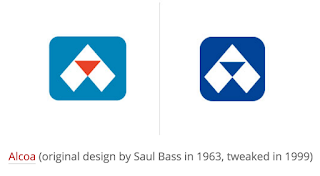In this session we learnt about different methods to collect some primary research and their respective pros and cons. For the task we were asked to consider whether any primary research methods could be used for our essays. First, I need to think about what I want to find out for the essay.
One of the main things that interests me is how logo exposure affects peoples views on them. The more exposure a logo has the less it is visually read, and it just becomes a familiar icon. I want to see if people can analyse a logo and see if saturation makes something appear timeless.
I had already thought about doing some primary research, especially for my design piece. I was thinking of compiling a portfolio of classic logo designs vs their modernist equivalents to compare and contrast what timelessness actually means. For the actual essay itself I could show logos in a survey and see what makes the classic logos appeal to people. I would avoid asking designers because I feel like they would have some bias towards some of the logo designs. However I am not sure whether using primary research for the essay would be necessary. I feel it would confuse the argument about modernism vs saturation.
After consulting with Simon he said that I should look at what kind of visual cultures would describe a particular era e.g. That 70s show with the bubble serif font. Would people notice this and be able to place it in a time period? I find this quite interesting and I may try it for the design work to see if I can create a logo that couldn't be placed on a timeline.
Monday, 30 November 2015
Monday, 2 November 2015
OUGD501 - Study Task 4 & 5 - Planning & Structuring an Essay
My question:
Is it possible for a logo to be timeless?
Which Academic Sources will you reference?
What Graphic Design will you analyse?
Logo designs by:
Essay Map:
INTRODUCTION
- Introducing what I will outline in the essay
- Why am I exploring logo design
- What I may learn or what my aim for the essay is
PARAGRAPH 1
- History of logo design
- How did it become a global phenomenon
PARAGRAPH 2
- What affect do logos have on people - a friendly face to a brand?
PARAGRAPH 3
- Compare logo theories of a couple of designers e.g. Vignelli vs Bierut vs Bass
- Does modernism values = timelessness?
- Logo recognition
PARAGRAPH 4
- Should a logo be changed that is already effective to suit a trend?
- Explore trends in logos
CASE STUDY/IMAGE ANALYSIS
- Logos then vs now
- Modernism vs Trends
CONCLUSION
- Can logos be timeless? Support this with theories and quotes
Peer Feedback – How could this Essay Map be refined / developed?
Is it possible for a logo to be timeless?
- Klein, N. (2000) 'No Logo'. London: Flamingo.
- Wang, S. (2011) 'Big Brand Theory'. Berkeley, CA: Gingko Press.
- Olins, W. (2004) 'On Brand'. London: Thames & Hudson.
- Hetherington, K. (2008) 'Capitalism's Eye: Cultural spaces of commodity'. London: Routledge. p.25-50
- Gobé, M. (2001) 'Emotional Branding'. New York: Allworth Press.
- Bierut, M. (2015) 'How to'. New York: Harper Collins.
- Bass, J, Kirkham, P, and Bass, S. (2011) 'Saul Bass'. London: Laurence King.
- Bass, J, Kirkham, P, and Bass, S. (2011) 'Saul Bass'. London: Laurence King.
What Graphic Design will you analyse?
Logo designs by:
- Saul Bass
- Massimo Vignelli
- Michael Beirut
Essay Map:
INTRODUCTION
- Introducing what I will outline in the essay
- Why am I exploring logo design
- What I may learn or what my aim for the essay is
PARAGRAPH 1
- History of logo design
- How did it become a global phenomenon
PARAGRAPH 2
- What affect do logos have on people - a friendly face to a brand?
PARAGRAPH 3
- Compare logo theories of a couple of designers e.g. Vignelli vs Bierut vs Bass
- Does modernism values = timelessness?
- Logo recognition
PARAGRAPH 4
- Should a logo be changed that is already effective to suit a trend?
- Explore trends in logos
CASE STUDY/IMAGE ANALYSIS
- Logos then vs now
- Modernism vs Trends
CONCLUSION
- Can logos be timeless? Support this with theories and quotes
Peer Feedback – How could this Essay Map be refined / developed?
- Question has been refined further to be more specific and will now be good to explore in detail. Interesting question.
- Lots of sources
- Relevant to your practice.
OUGD501 - Logo Design - Saul Bass Logos
http://www.logodesignlove.com/saul-bass-logos
Saul Bass was one of the pioneers of design in
the 1950s having already revolutionised film titles for films such as ‘Psycho’
for Alfred Hitchcock, which design will be eternally recognisable. He had been
working on corporate identities since the early 1950s, but from the mid 1960s
he began to work on more complex projects (Sinclair, 2014). He designed many
classic American logos that we recognise today from Quaker oats and Kleenex to
the Warner Communications Company. Each of these companies has pretty much
stuck to his original designs. One of his most iconic quotes – a quote that I
believe should be thought of whenever producing logo design – is as follows:
“If I do my job well, the identity program will also clean up the image of the company, position it as being contemporary and keep it from ever looking dated.”— SAUL BASS
Subscribe to:
Comments (Atom)







